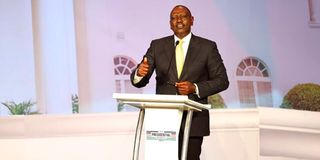Premium
We need better preparations for future debates

UDA Party presidential candidate and Deputy President William Ruto during the Presidential Debate at the Catholic University of Eastern Africa on July 26, 2021.
What you need to know:
- There’s a need to come up with a scoring criterion to guide the public on who ‘won’ the debate.
- We need to ‘level’ the playing ground by treating all contestants equally and accord them equal time.
As campaigns for the 2022 General Election enter the home stretch, the strategies employed by the main contestants have included personal attacks.
This involves attacking the record of opponents, taking the offensive position on issues and emphasising optimism for the future – but never presenting concrete solutions for problems facing the country.
While the four presidential aspirants have released their blueprints, they have not been thoroughly scrutinised by voters for their veracity and viability.
This test for quality and fact-checking would best have been achieved through a well-prepared and executed presidential debate, which generally helps voters to unravel the ‘how’ and ‘why’ of pronouncements made in public rallies.
According to Jeffrey Auer, a political communication authority, debates have several elements.
He defined a presidential debate as a confrontation in equal and adequate time of matched contestants on a stated proposition to gain an audience decision.
While such debates have been moderated before in Kenya (2013 to be precise) with varying degrees of success, in 2022 the audience may have been denied what was touted to be a titanic political moment pitting the erstwhile Pentagon friends-turned-foes, Raila Odinga and William Ruto.
Downgrade
Several factors may have led to the downgrade of the presidential debate in 2022 to a one-man TV interview.
First, there were allegations of bias by organisers who split the debate to feature two candidates for each session according to the perceived degree of strength as contenders.
This amounts to discrimination and profiling of candidates as either weak or strong.
While the matching of contestants is a debate factor, in a fragile democracy like Kenya, we need to ‘level’ the playing ground by treating all contestants equally, accord them equal time, and moderate with equanimity to defuse the rising political tensions.
Secondly, the general tone and build-up to the debates are premised on the adversarial, pitting the candidates against each other on the one hand, and the media (panellists) and the debaters on the other.
This may not augur well for the desired peaceful elections.
Thirdly, the style of moderation is key.
Since the debates are guided interviews to extract facts, moderators should be firm, and ensure candidates satisfactorily answer the questions to the understanding of the least discerning members of the audience.
Lastly, there’s a need to come up with a scoring criterion to guide the public on who ‘won’ the debate.
As it is now, the person with greater hubris, braggadocio and adept at firing broadsides to the opponent that have no relevance to the pertinent issues is usually declared the winner by an undiscerning audience.
These considerations would add value and make future presidential debates more desirable both for candidates, the audience and the organisers.
Mwongera Gichunge, Nairobi




